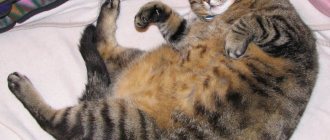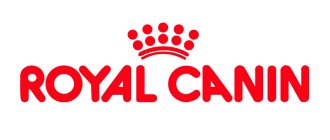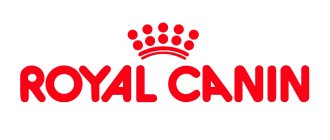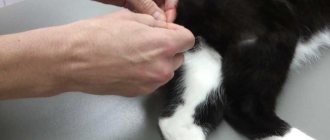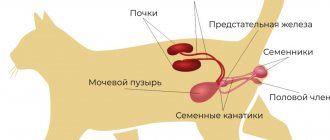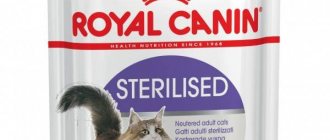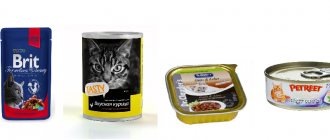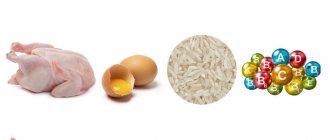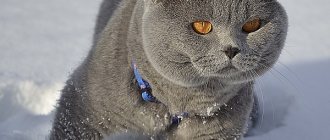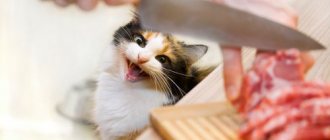It has been proven that cats and female cats become more obedient and affectionate after sterilization and castration. However, such an operation leads to serious changes in the animal’s body. A loving owner must take into account these physiological characteristics and be able to choose food wisely.
- 2 Rules for feeding pets
- 3 Specialized feeds: selection criteria
3.1 Which food is better: dry or wet?
- 4.1 Table: specialized feeds and their characteristics
What should you consider?
Cats and cats are obligate carnivores. In nature, they hunt birds, small rodents, and insects. The basis of their diet is animal protein. However, fats, carbohydrates, vitamins and minerals must also be present. Otherwise, health problems will arise.
Castration and sterilization lead to a decrease in activity and the appearance of excess weight. If the animal drinks little, there is a risk of developing urolithiasis (urolithiasis).
The ratio of calcium, phosphorus and magnesium plays an important role. Imbalance of minerals leads to the formation of crystals, sand and stones in the kidneys or bladder. If phosphorus and magnesium levels are elevated, tripel phosphates (struvite) are formed. They can be dissolved through diet and medication. Excess calcium leads to the formation of oxalates, which are removed surgically.
Prevention of ICD is a properly balanced diet. Industrial feeds include the required amount of proteins, fats, carbohydrates, moisture, fiber, ash (mineral residues), vitamins and minerals. A low-calorie diet with a reduced content of calcium, phosphorus and magnesium has been developed especially for castrated cats.
Veterinarians recommend not feeding pets with special needs homemade food. This is due to the fact that it is difficult to balance microelements on your own. Only a veterinary nutritionist can do this.
It is important to adhere to the feeding rate indicated on the package. Sterilized animals often have an increased appetite. However, the supplement should not be given. Obesity in neutered cats is fraught not only with urolithiasis, but also with heart and liver problems.
Neutered animals should drink plenty of water, especially if they eat dry food. When feeding homemade food, natural or canned food, the need for liquid decreases, since such food already contains 70-80% moisture.
The main thing in choosing a nutritional system for castrated animals is the correct ratio of minerals, reduced levels of fat and ash, and the presence of vitamins and microelements.
Components of a sterilized cat's diet
In addition to store-bought food, which has its own advantages and disadvantages, it is acceptable to have natural products in the daily diet, provided they are additionally enriched with a vitamin complex.
- Porridge made from cereals such as rice, corn, wheat or oatmeal with the addition of lean meat;
- Dietary types of meat: chicken, turkey or rabbit;
- Canned food with a specialized sign “for sterilized cats”;
- Grass grown at home or purchased in a container at a pet store;
- Liquid meat broth.
What to exclude from your diet
The first product that should be excluded from the daily diet is fish. This is due to the increased content of phosphorus in it, which has a negative effect on the condition of the urinary system. An excessive amount of this microelement in the body causes the development of urolithiasis. You should also exclude salted and smoked sausages.
Types of wet food
Depending on the components, food additives and energy value, canned food is divided into 2 types:
- Full-featured. They are enriched with all essential vitamins and minerals and are suitable as a staple food.
- Non-complete (treats). They are a complement to dry food, homemade food or natural food. They contain a lot of protein, but little fat and carbohydrates. Not all vitamins and minerals are included in the treats.
Complete canned food can be easily distinguished from non-complete canned food. The first contains more than 5% fat. In treats this figure is less than 5%. The animal can be fed complete canned food daily. Treats are given no more than 2 times a week.
Depending on the quantity and quality of meat and natural ingredients, wet food is divided into classes:
- Economy The product contains no more than 4% meat and its derivatives. This concept covers production waste: feathers, skin, bones, beaks, intestines. Flavorings and taste enhancers are added to economy class food.
- Premium Canned food contains 30-40% meat components (meat and offal), but their quality is questionable. There are flavoring and aromatic additives. The composition is balanced, it contains vitamins and minerals.
- Super premium. These are high quality products. It contains 60-70% natural meat and offal (lungs, heart, liver, kidneys).
- Holistic. Canned food contains more than 70% meat. They are made on the basis of products suitable for human food, do not contain flavoring and aromatic additives, grains and soy. However, such canned food is used as treats.
Wet food is available in:
- spiders;
- sealed jars;
- aluminum lamisters;
- plastic pots.
Economy and premium wet food looks like soft croquettes in sauce or jelly. High-quality canned food contains whole meat fibers and pieces of offal. Super premium food is also available in the form of pates.
Preventing diseases with proper nutrition
In order to prevent the occurrence of undesirable consequences in an animal after castration or sterilization, it is recommended to take preventive measures: To prevent obesity, you should choose specialized good food specifically designed for sterilized pets.
You must not exceed the daily allowance of dry granules; you must strictly follow the recommendations given on the packaging. Neutered cats should be fed twice a day (morning and evening). In some cases, for pets prone to obesity, repeated fractional feeding in small portions is allowed. For weight loss, the dosage is reduced by 15%.
When the cat is less active, it requires less energy, so it needs to be switched to a diet that is lower in calories but more nutritious. Such foods are characterized by a reduced content of fats and carbohydrates, and also help control the acidity level of urine. Some manufacturers add L-carnitine to their products, which promotes the conversion of adipose tissue into muscle tissue and also supports the functioning of the cardiovascular system.
Urolithiasis in cats most often manifests itself between 2 and 5 years of age, so to prevent the disease it is necessary to undergo a general urine test at least once every 6-8 months. It is important to detect the formation of stones in time in order to take appropriate measures. The disease can be asymptomatic for several years and in advanced cases, surgical intervention will no longer help.
Advantages and disadvantages
Complete canned food is as close as possible to the natural diet of obligate carnivores. They contain about 80% moisture, minerals, and vitamins. They have balanced analytical components. In terms of energy content, this type of food is suitable for sterilized cats.
The advantages of wet food are:
- humidity 70-80% (good for pets who drink little);
- the presence of different tastes and medicinal diets;
- long-term storage in sealed packaging;
- convenience of dosage;
- natural texture;
- easily digestible components;
- high degree of saturation.
The disadvantages of this type of nutrition are:
- high cost;
- storage of opened packaging for no more than 2 days in the refrigerator;
- lack of tartar prevention.
Some pets refuse full-ration canned food and eat only dry food. In this case, treats are suitable. They can diversify feeding and increase the amount of moisture consumed. However, you should not give treats every day.
Features of feed types
Advantages and disadvantages of a natural diet
The list of benefits of a natural diet includes:
- The products do not contain dyes, preservatives or flavors;
- Meat by-products and whole meat are found in large quantities;
- The ability to independently adjust how to give the proportions of ingredients;
- Sufficient moisture content.
The disadvantages of a natural menu are:
- Significant costs;
- The need to purchase ingredients yourself;
- Wasting time on cooking;
- The finished product is not stored for long;
- Mandatory adherence to the regime to which the animal is accustomed;
- Difficulties in selecting an additional vitamin and mineral complex;
- The need for knowledge about creating a balanced diet.
Advantages and disadvantages of dry store-bought food
The list of benefits of a dry diet includes:
- Relatively low costs;
- You don't have to cook it yourself;
- Contains a vitamin-mineral complex;
- The balance of the components is ensured by the manufacturer;
- Possibility to choose from a variety of flavors;
- There are special foods for sterilized cats.
The disadvantages of dry food are:
- Insufficient moisture;
- Availability of flavor enhancers and flavors;
- The diet is not natural.
Advantages and disadvantages of canned food
The list of advantages of canned food in a can or pack includes:
- High moisture content;
- No cooking time required;
- Many cats enjoy canned wet food;
- Eat with seafood, meat and fish.
Negative aspects of canned cat food in lamister or in a bag:
- Higher cost;
- Does not prevent the risk of tartar formation;
- If there is an excess in the tray, a stool disorder may be detected.
What to look for when choosing wet food?
In order for a cat to feel good, it is necessary to take a responsible approach to the choice of food. When purchasing a wet complete food or treat, you need to pay attention to:
- best before date;
- the conditions under which the product was stored;
- transparency of the composition;
- amount of meat and offal;
- ratio of calcium, phosphorus and magnesium;
- moisture percentage;
- the presence or absence of good reviews;
- manufacturer and country of manufacture (for example, Royal Canin canned food belongs to a French brand, but can be manufactured in France, Poland or Russia);
- individual needs of the animal;
- value for money;
- absence of flavorings and flavor enhancers.
The more meat in wet food, the better. However, ingredients such as rice, legumes or vegetables are also beneficial in small quantities. Therefore, when choosing canned food for sterilized pets, it is important to review the composition.
If the animal does not gain weight or is hyperactive, the daily dose indicated on the package can be increased. If signs of obesity are detected, the recommended daily amount of feed is reduced.
How to choose food
Important! You should not buy food just because the packaging is marked “for sterilized cats.” You must read the ingredients carefully. If the package says “Light”, this indicates that the manufacturer has reduced fats and adjusted the carbohydrate content.
It is recommended that owners of cats who are prone to obesity after neutering buy this type of food. The amount of proteins must be at least 50%. Mineral substances in high-quality food for sterilized animals are no more than 7%. It is advisable to choose food of the “holistic” and “super-premium” classes.
Premium class
For castrated and sterilized cats, premium wet food is available from the following brands:
- Brit Premium;
- Royal Canin;
- ProPlan;
- Hill's;
- Stuzzy Cat;
- Morando Miogatto and Migliorgatto;
- Bozita.
The cost of premium wet food varies between 60-90 rubles per pouch, lamister or jar up to 100 g.
Dangerous products
Some foods are strictly prohibited from being given to castrated and sterilized furry couch potatoes. These include smoked meat, various salty foods (sausages, frankfurters), semi-finished products (dumplings, etc.).
It is dangerous to feed cats after sterilization with industrial food that is not adapted to the requirements of the body of a castrated animal. They will lead to excess weight gain, problems with the urinary tract, and deterioration of kidney function.
Invalid information block
Super premium
Super premium canned foods include:
- Animonda Vom Feinsten;
- Animonda Carny;
- Almo Nature;
- Brit Care;
- Gina;
- Baskerville;
- Leonardo;
- Berkley;
- Lovely Hunter;
- Nutrilove;
- Natures Protection.
Neutered cats should not be given super premium kitten food. It contains an increased amount of vitamins and minerals, which can negatively affect the health of an adult animal.
Holistics
The best among holistic-class canned foods are:
- Applaws;
- Schesir;
- Gimpet.
They are all treats. They cannot be used as the main food. They are given a maximum of 2 times a week. They contain a lot of animal protein.
However, the vitamins and minerals needed for balance are missing. If you feed your pet only these canned foods, calcium stones (oxalates) may form in the kidneys or bladder.
Changes in the animal's body
After sterilization, irreversible changes occur in the pet’s body, primarily affecting hormonal levels. All this leads to the cat becoming prone to various pathologies.
- Stagnation of urine in the bladder. Sterilized animals defecate much less frequently after the procedure, which entails the development of all sorts of problems. For example, stones and sand can form in the bladder and kidneys. Cystitis occurs equally rarely in sterilized cats.
- Changes in hormonal levels. During sterilization, glands that produce sex hormones are removed from a cat. That is why after the procedure the natural instinct of reproduction disappears in animals. As a result, they stop looking for a suitable partner and compete for their territory. This is why castrated cats sleep a lot, move little and are not interested in games.
- Slowing down metabolic processes. The gonads of cats produce hormones that help them quickly burn calories. And after the level of these substances in the body decreases, metabolism slows down and subcutaneous fat begins to be deposited.
- Increased appetite. In the body of castrated cats, the level of prolactin, which controls metabolic processes, increases significantly. Its excess entails an increase in appetite. This is why animals after sterilization can easily eat two servings at once and still ask for more. As a result, cats often gain extra pounds.
To avoid these problems, the owner of a neutered pet should radically change its diet.
Veterinarians' opinion
Evgeniy, 49 years old, Samara.
Before choosing food, I always advise having the animal’s urine tested. At a neutral pH level (6-6.5), universal, complete, super-premium canned food is suitable. If the urine is alkaline, it is better to feed the animal dry or wet food specifically for castrates.
Alina, 34 years old, Voronezh.
If castrates eat complete canned food (not necessarily special), the risk of developing urolithiasis is reduced. I recommend diluting wet food with water (10-20 ml) for cats and cats who don't drink enough. This increases moisture consumption.
Mikhail, 52 years old, Irkutsk.
Cats and cats get used to the type of food chosen by their owner. I recommend combining dry and wet food. For example, you can give dry food in the morning and lunchtime, and wet food in the evening. However, this must be done on an ongoing basis so as not to provoke problems with the stomach and intestines.
All information posted on the site is provided in accordance with the User Agreement and is not a direct instruction to action. We strongly recommend that before using any product, you must obtain a face-to-face consultation at an accredited veterinary clinic.
Feed reviews from customers
“I gave Proplan to my 3 castrated Persian cats. There were never any problems with my health. After consultation with the veterinarian, she was transferred to a special Proplan line for neutered people. After this, my pets lost weight sharply and are constantly begging for food. I’m trying to slowly switch to the old diet, since this line didn’t suit me.”
“We have been buying Hills for our castrato for 4 years, everything is fine with the digestive system, he feels great and is not gaining weight. I’m happy with Hill’s products and will buy more.”
“After castrating our Barsik, we bought several foods of different brands and looked at the cat’s reaction to them. The cat liked the food from Purina for sterilized cats better. He eats with pleasure. You can choose different flavors. Barsik was delighted with all the tastes and the price was reasonable.”
